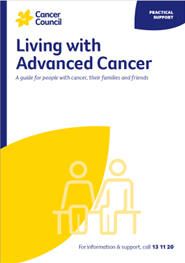- Home
- About Cancer
- Advanced cancer
- Living with advanced cancer
- Key questions
Key questions
The questions below may help you to understand your options if you have been diagnosed with advanced cancer, and ways that you can manage your diagnosis.
Learn more about:
- What will advanced cancer mean for me?
- What treatments are available?
- How will advanced cancer affect my day-to-day life?
- Do I need to think about palliative care?
- What can I expect in the future?
What will advanced cancer mean for me?
Although advanced cancer usually can’t be cured, it can often be effectively controlled. It’s important to realise that incurable doesn’t mean untreatable – sometimes treatment can be very effective. Treatment may be able to shrink, stop or slow the spread of advanced cancer. In other cases, it can help to relieve symptoms.
Treatment can often keep the cancer under control and maintain quality of life, sometimes for several years. When this happens, the cancer is considered to be a chronic (long-term) disease.
What treatments are available?
Your treatment options will depend on where the cancer started, how far and where it has spread to, and whether it is hormone dependent or has certain genetic changes. Your doctor will also consider your symptoms and general health when recommending treatment.
Common treatments to control the cancer and relieve side effects include chemotherapy, radiation therapy, surgery, targeted therapy, hormone therapy and immunotherapy. These may be used alone or in combination.
Some people join clinical trials to try new treatments.
Treatments can be used for different reasons, so talk to your health care team about the aim of each treatment. For further details, see Treatment for advanced cancer.
→ READ MORE: How will advanced cancer affect my day-to-day life?
Podcast: What does Advanced Cancer Mean?
Listen to more of our podcast for people affected by advanced cancer
More resources
Dr Lucy Gately, Medical Oncologist, Alfred Health and Walter and Eliza Institute for Medical Research, VIC; Dr Katherine Allsopp, Supportive and Palliative Care Specialist, Westmead Hospital, NSW; A/Prof Megan Best, The University of Notre Dame Australia and The University of Sydney, NSW; Dr Keiron Bradley, Palliative Care Consultant, Medical Director Palliative Care Program, Bethesda Health Care, WA; Craig Brewer, Consumer; Emeritus Professor Phyllis Butow, Psychologist, The University of Sydney and Chris O’Brien Lifehouse, NSW; Louise Durham, Palliative Care Nurse Practitioner Outpatients, Princess Alexandra Hospital, Metro South Palliative Care, QLD; Dr Roya Merie, Radiation Oncologist, ICON Cancer Centre, Concord, NSW; Penny Neller, Project Coordinator, National Palliative Care Projects, Australian Centre for Health Law Research, Queensland University of Technology, QLD; Caitriona Nienaber, 13 11 20 Consultant, Cancer Council WA; Xanthe Sansome, Program Director, Advance Care Planning Australia, VIC; Sparke Helmore Lawyers; Peter Spolc, Consumer.
View the Cancer Council NSW editorial policy.
View all publications or call 13 11 20 for free printed copies.
Need to talk?
Support services
Coping with cancer?
Speak to a health professional or to someone who has been there, or find a support group or forum
Looking for transport, accommodation or home help?
Practical advice and support during and after treatment
Cancer information
Dealing with the diagnosis
Common reactions to a cancer diagnosis and how to find hope
Explore our resource hub
Explore and download our booklets, fact sheets, podcasts, webinars and videos for people affected by cancer

